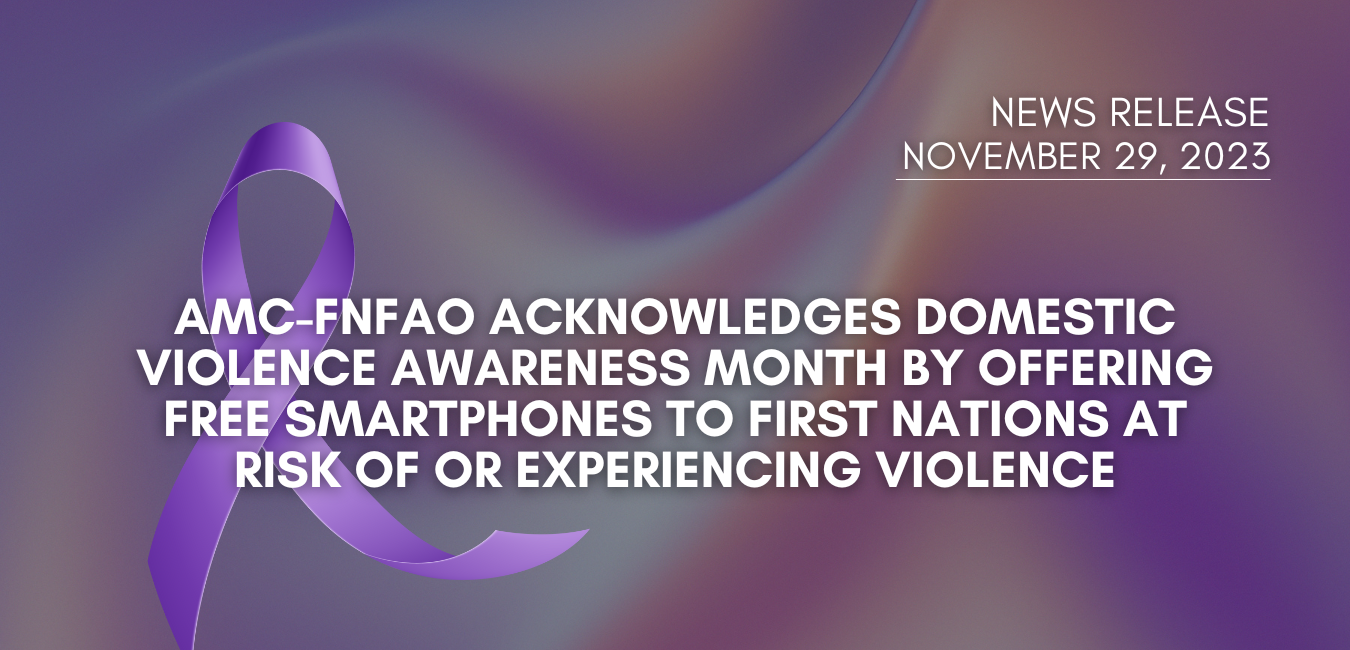AMC-FNFAO Acknowledges Domestic Violence Awareness Month by Offering Free Smartphones to First Nations at Risk of or Experiencing Violence

November 29, 2023
Treaty One Territory, Manitoba
AMC Communications
Treaty One Territory, Manitoba – In recognition of Domestic Violence Awareness Month, the Assembly of Manitoba Chiefs – First Nations Family Advocate Office (AMC-FNFAO) is providing free smartphones to those who may be at risk of or experiencing violence.
According to Statistics Canada, about two-thirds of First Nations (64%) women have experienced violent victimization in their lifetime. Furthermore, according to FNFAO research, since January 2023, 25 First Nations women have lost their lives. This rate accounts for more than two female First Nations losing their lives every month. This vulnerability increases depending on socioeconomic status, their geographical location, if they live with a disability, and if they identify as 2SLGBTQQIA+. The targeting of these identities demonstrates the way that colonialism has very real and contemporary impacts on the safety and livelihoods of First Nations people.
“We are aware that First Nations women, girls, and 2SLGBTQQIA+ people are disproportionately affected by violence in this province,” said AMC Grand Chief Cathy Merrick, “For many First Nations victims of violence, discrimination and racism have been attributed as one of the leading causes that prevent them from seeking out support. Fearfulness of Child and Family Services (CFS) intervention or poor treatment and disbelief from police services keeps many individuals trapped in the cycle of violence which has far-reaching implications for the entire family system.”
Since the beginning of the COVID-19 pandemic, instances of violence against these individuals have escalated due to the increasing obstacles in obtaining support. The lack of cultural safety and systemic barriers experienced by victims of violence require comprehensive and culturally sensitive solutions that prioritize prevention, treatment, and support services to prevent further tragedies. One of the ways in which the AMC-FNFAO is actively aiding victims, survivors of violence, and those affected by family violence is through its partnership with TELUS and their Mobility for Good program. This initiative involves distributing free smartphones and plans to support First Nations women, girls, and 2SLGBTQQIA+ individuals in Manitoba who are at risk of violence or are already survivors of it.
For many, access to a cell phone can make the difference between life and death, and it’s crucial that regardless of one’s economic circumstances, safety remains readily accessible.
“Reconciliation must take a collaborative approach in order to address systemic gaps and to promote a greater understanding of intersectionality and the way certain identities are victimized disproportionally within Canadian society. Our duty is to understand each other’s needs and keep each other safe physically, emotionally, mentally, and spiritually. We must work diligently to increase pathways to safety that enable victims to escape the cycle of violence,” concludes Grand Chief Merrick.
The AMC-FNFAO stands united in its call for systemic change to increase safety for First Nations women, girls, and 2SLGBTQQIA+ individuals who are at risk of violence and encourage all other systems of support to improve their collaborative efforts and cultural safety education to promote safer pathways to receiving care, not only in the event of violence but to prevent their occurrence overall.
For more information, please contact:
Communications Team
Assembly of Manitoba Chiefs
Email: media@manitobachiefs.com
About the Assembly of Manitoba Chiefs
The AMC was formed in 1988 by the Chiefs in Manitoba to advocate on issues that commonly affect First Nations in Manitoba. AMC is an authorized representative of 62 of the 63 First Nations in Manitoba with a total of more than 151,000 First Nation citizens in the province, accounting for approximately 12 percent of the provincial population. AMC represents a diversity of Anishinaabe (Ojibway), Nehetho / Ininew (Cree), Anishininew (Ojibwe-Cree), Denesuline (Dene) and Dakota Oyate (Dakota) people.